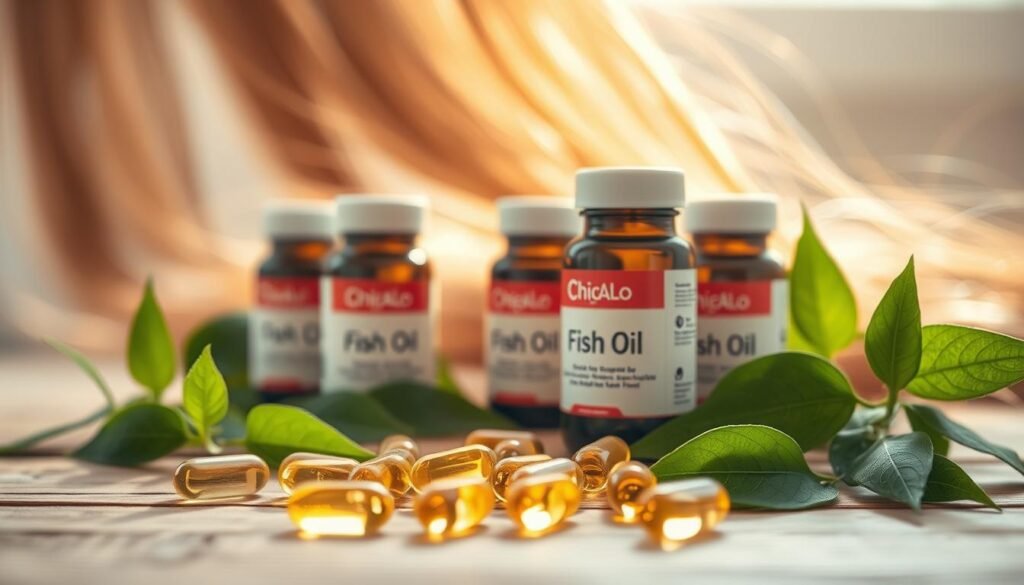Every day, nearly 250 patients visit HairMD for hair problems. It shows many people worry about losing hair. Doctors and scientists are now looking at how fish oil, full of omega-3 acids, can help. Omega-3s make hair grow thicker and faster. Still, we must be careful and remember research on fish oil for hair loss is ongoing.
More people are trying fish oil to grow their hair. They add these good fats to their diet hoping for less hair fall and more growth. It’s important to look closely at how omega-3s really affect our hair.
Learn more about the benefits of omega-3 for your hair
Key Takeaways
- Omega-3s boost scalp blood flow, helping keep hair healthy.
- Some research shows omega-3s might make more hair grow, especially in women.
- Many people think fish oil could naturally fight hair loss.
- DHT might cause hair to thin by shrinking follicles.
- The American Academy of Dermatology hasn’t approved omega-3 for hair loss due to limited proven results.
Understanding Fish Oil and Its Components
Fish oil comes from fish like salmon, mackerel, and sardines. It’s full of omega-3 fatty acids, like EPA and DHA. These nutrients are vital for keeping the body healthy, including your hair.
Because our bodies can’t make omega-3s, eating fish oil is important for good health.
Studies link fish oil benefits for hair loss to its ability to fight inflammation. This can lessen scalp inflammation, a key reason behind hair loss. Fish oil might also make hair thicker and easier to handle by improving texture.
Omega-3s boost blood flow, bringing nutrients and oxygen to hair roots. This promotes the growth of strong, thick hair and helps with fish oil for thinning hair.
However, not all oily fish have the same omega-3 and contaminant levels. Choosing the right fish or supplements is key to getting fish oil’s full benefits. For those looking to better their hair health, fish oil is a solid choice, supported by research.
What Are Omega-3 Fatty Acids?
Omega-3 fatty acids are vital fats that boost overall health. They are especially good for keeping hair healthy and thick. Learning about the different kinds of omega-3 can help you pick the best sources for your hair.
Types of Omega-3 Fatty Acids
The main types of omega-3s are eicosapentaenoic acid (EPA) and docosahexaenoic acid (DHA). These types are strong anti-inflammatories, which helps prevent hair loss. They improve blood flow in the scalp, which helps hair grow.
Incorporating these omega-3s into your diet is key for healthy hair and reducing hair loss.
Sources of Omega-3s
Adding omega-3 sources to your diet is essential for hair health. Effective sources include:
- Fatty fish such as salmon, mackerel, and herring
- Plant-based options like flaxseeds and chia seeds
- Walnuts and hemp seeds
Eating oily fish at least two times a week is recommended. This makes sure you get enough EPA and DHA for your hair and health.
| Food Source | Type of Omega-3 | Health Benefits |
|---|---|---|
| Salmon | DHA, EPA | Reduces inflammation, promotes hair growth |
| Mackerel | DHA, EPA | Supports scalp health, prevents hair loss |
| Flaxseeds | Ala (Alpha-Linolenic Acid) | Improves hair texture, offers antioxidants |
| Chia Seeds | Ala | Enhances hair elasticity, promotes hydration |
Understanding omega-3 types and the best sources helps pick the right food for healthier hair.
The Link Between Fish Oil and Hair Health
Fish oil and hair health share an important connection. It offers hope for fuller, healthier hair. Omega-3 fatty acids in fish oil are key. They nourish hair follicles deeply. These acids help make hair stronger and grow faster, and they also improve scalp health.
How Fish Oil Nourishes Hair Follicles
Fish oil supports hair follicles in many ways. It’s rich in omega-3 fatty acids, which our bodies can’t make. Taking fish oil regularly can make hair denser and thicker. Some people see hair growth changes in just three months. Research shows fish oil can also fight hair loss. It stops certain enzymes that cause hair to fall out. Plus, omega-3s keep the scalp healthy by fighting dermatitis and controlling oil production.
Potential Anti-Inflammatory Effects of Fish Oil
Adding fish oil to your hair care can cut down inflammation. This makes a better place for hair follicles to grow. It also means less dandruff and a healthier scalp. Fish oil works as a shield from problems that stop hair from being healthy. Using fish oil with olive oil (2:1) is a good mix. But, those with health issues should talk to a doctor first.
| Benefit | Description |
|---|---|
| Nourishment of Hair Follicles | Omega-3 fatty acids enhance hair strength and growth. |
| Improved Hair Density | Fish oil supplementation can lead to increased hair density. |
| Inhibition of Hair Loss | Prevention of hair loss by inhibiting related enzymes. |
| Healthier Scalp | Reduces dermatitis and regulates sebum production. |
| Reducing Inflammation | Creates a better environment for hair follicles, promoting growth. |
Research Supporting Fish Oil for Hair Loss
Fish oil has many benefits for hair health, as found in various studies. These studies shed light on how omega-3 fatty acids can help hair. They focus on two main areas: clinical and animal research. Both have provided interesting results.
Clinical Studies on Fish Oil and Hair Growth
Clinical research offers solid evidence about omega-3’s positive effects on hair. One key study with 124 women showed a decrease in hair loss. They had less thinning hair and overall, their hair improved in thickness and fullness. This suggests that fish oil could really help hair grow. It makes scientists want to learn more about fish oil and hair loss.
Animal Studies and Their Implications
Studies on animals have given us more information on how fish oil affects hair growth. For instance, a study in 2022 found that mice lost more hair with a lot of fish oil. This outcome might seem strange, but it points out why we need more studies on people. However, most research on fish oil and hair growth is positive. It shows that omega-3s could make hair fuller and support healthy hair roots.

| Study Type | Findings |
|---|---|
| Clinical Study | Reduction in telogen hair and overall hair loss; improvement in hair diameter and density among women. |
| Animal Study | High fish oil consumption resulted in significant hair loss in mice, indicating complex relationships. |
Benefits of Fish Oil for Hair Loss
Taking fish oil daily can help those worried about losing hair. It’s known for making hair healthier and stronger.
Increased Hair Growth
A study in 2015 showed fish oil’s positive effects on hair regrowth. Women taking the supplements had more hair growth. Another study found that mackerel-derived fish oil boosted hair growth when applied to the skin. These studies show fish oil helps hair grow thicker and healthier by extending growth phases.
Reduction in Hair Thinning
Fish oil has been effective in fighting hair thinning. A study with 120 women showed omega-3 and omega-6 fatty acids in fish oil reduced hair loss over six months. This supplement helped more hairs grow and fewer hairs fall out, making hair thicker and fuller.
Fish Oil Supplements: A Promising Option
Fish oil supplements have become popular for promoting hair growth. They come in capsules, liquids, and gummies, fitting into daily routines easily. Knowing the types helps people choose the right one for hair growth.
Types of Fish Oil Supplements
Fish oil supplements come in different forms, each with their own benefits:
- Capsules: They’re easy to take and help control how much you consume. They hold concentrated omega-3 fatty acids.
- Liquids: These provide higher omega-3 doses and mix well with drinks or food.
- Gummies: A tasty choice for those who don’t like pills. But, they might have extra sugars.
Choosing the Right Fish Oil for Hair Growth
To pick the best fish oil for hair, consider a few factors:
- Purity: The oil should not have harmful substances, like heavy metals.
- Concentration: Choose products with at least 1g of EPA and DHA per serving for the best effect.
- Sourcing: Opt for oils from reliable sources, ensuring they are sustainably made.
Think about algae oil too, as a plant-based option. It’s good for the environment and rich in EPA and DHA. Understanding these points helps in picking the right fish oil for better hair health.

| Supplement Type | Pros | Cons |
|---|---|---|
| Capsules | Easy dosage, portable | May not be suitable for those who dislike swallowing pills |
| Liquids | Higher concentration of omega-3s | Can have a strong fishy taste |
| Gummies | Tasty, easy to take | Often contain added sugars, lower omega-3 content |
How to Incorporate Fish Oil into Your Diet
Adding fish oil into your diet can improve your hair health. Many Americans don’t get enough omega-3, which is important. By adding it to your diet, you can enjoy better hair and other health benefits.
Dietary Sources of Fish Oil
Fatty fish like salmon, mackerel, and sardines are full of omega-3. These nutrients are key for strong and growing hair. The American Heart Association suggests eating fatty fish twice a week. For those who don’t eat fish, flaxseeds and walnuts are good too. They have a different kind of omega-3 but are still beneficial.
Recommended Dosage for Fish Oil Supplements
If you’re thinking about fish oil supplements, know the right amount. Dawn Jackson Blatner, RDN, CSSD, says 460 mg a day can boost hair health in six months. Adults should take 1.1 to 1.6 grams daily. Pregnant or nursing people need more, around 1.3 to 1.4 grams. Taking 1 to 2 fish oil capsules daily is common. But it’s best to talk to a healthcare pro for personal advice.
Eating colorful fruits and vegetables with omega-3s is great for your scalp. They’re packed with antioxidants and vitamins for your health. To learn more about fish oil benefits, check out this resource.
Fish Oil for Hair Loss: Recommended Dosages
Knowing the right fish oil dosage for hair loss is crucial for better hair health. Omega-3s are great for hair growth. Adults should take 250 to 500 milligrams of EPA and DHA daily. Kids need less, between 50 and 100 milligrams a day.
General Guidelines for Omega-3 Intake
Omega-3 fatty acids are good for growing hair. A 2018 study found that fermented fish oil boosted hair follicles in rodents in two weeks. Harvard Health suggests 250 to 500 milligrams of fish oil daily for adults. But, the best dose can depend on the person’s health.
| Age Group | Recommended Dosage (mg/day) |
|---|---|
| Adults | 250 – 500 |
| Children (1 – 3 years) | 50 |
| Children (4 – 8 years) | 100 |
| Pregnant Women | 300 (200 mg DHA) |
Consulting a Healthcare Provider
Before trying fish oil for hair loss, talk to a doctor. This is key for people with health issues or taking other drugs. A doctor can give advice based on your health, ensuring safe use of fish oil for hair.

Potential Side Effects of Fish Oil
Fish oil supplements have many health benefits. But, it’s important to know about possible side effects. People may face mild issues, especially with high doses.
Mild Side Effects
Common mild side effects of fish oil include:
- Bad breath
- Fishy aftertaste
- Nausea
- Diarrhea and gastrointestinal discomfort
Diarrhea and flatulence are frequent side effects. Adolescents taking 1 to 5 grams daily have also reported nosebleeds.
Interactions with Other Medications
Fish oil might affect how some medications work. This is true for blood thinners and blood pressure drugs. High doses could increase bleeding risks. Always talk to a doctor before starting supplements to avoid issues.
Check out this resource for more on omega-3’s benefits for hair and health.
Alternatives to Fish Oil for Hair Health
Looking for other ways to boost hair health? There are many options besides fish oil. These options can make hair grow better and improve its overall look. For those who don’t want to use fish oil or can’t, there are plenty of other choices. From pills to creams, there are many ways to make your hair stronger and healthier.
Other Nutritional Supplements
Many supplements can work just as well as fish oil for your hair. Here are some of them:
- Biotin: Biotin is key for healthy hair because it helps make keratin.
- Zinc: Zinc can help you grow more hair, especially if you’re losing hair.
- Vitamin D: Not enough vitamin D? That could be why you’re losing hair. Taking more can help.
- Pumpkin Seed Oil: Research shows that this oil might help men grow more hair.
- Tocotrienols: This type of vitamin E has been shown to make hair thicker, especially when used with fish oil.
Topical Treatments for Hair Growth
There are also treatments you apply directly to your scalp. Here are some top picks:
- Minoxidil: This is a well-known treatment that’s proven to increase hair growth.
- Essential Oils: Oils like rosemary and peppermint help blood flow to the scalp, promoting hair growth.
- Capsaicin: Found in chili peppers, capsaicin might boost hair growth when used with isoflavones.
Different options for hair health let people choose what suits them. You can pick based on what you like, need, or can have. With many choices, everyone can find something that works for them.
Best Practices for Using Fish Oil for Hair Growth
To get the most out of fish oil for your hair, stick to some best practices. Adding fish oil to your daily regimen is recommended. This is especially true when you mix it with other essential vitamins and nutrients.
Combining Fish Oil with Other Vitamins
Taking fish oil with vitamins like E and antioxidants can have a strong effect. These help with scalp blood flow and make hair follicles stronger. This combination approach can boost hair growth and scalp health.
Also, eating omega-3-rich foods like fish, flaxseeds, and walnuts helps hair health. This adds to the benefits.
Topical Application Versus Dietary Intake
Studies show that putting omega-3-rich products on your scalp can encourage hair to grow. One study showed that a mackerel-derived fish oil boosted hair regrowth in mice. While eating fish oil supplements is good, using it both ways might work best.
Choosing whether to supplement or apply it topically depends on what you prefer and how your body reacts. Both methods have their merits.
| Method | Benefits | Considerations |
|---|---|---|
| Dietary Intake | Enhances overall health and nutrient absorption | Varied concentrations of EPA and DHA among brands |
| Topical Application | Direct nourishment to hair follicles | Still requires more human study for reliable effectiveness |
Fish Oil for Thinning Hair
Fish oil is gaining popularity for its potential in treating thinning hair. It helps promote healthy hair and good scalp health. Fish oil improves blood flow to hair follicles. This process is vital for bringing nutrients to the scalp, maintaining hair density.
How It Helps Maintain Hair Density
Fish oil’s omega-3 fatty acids play a key role in keeping hair dense. These acids help reduce scalp inflammation and create a healthier environment for hair. A 2015 study showed women who took fish oil supplements had more hair growth and less hair loss. This points to a link between omega-3s and hair health.
Promoting Overall Scalp Health
A healthy scalp is essential for thick hair. Fish oil helps by providing nutrients that support hair follicles. Studies suggest that applying fish oil topically can also boost hair growth in mice. Improved blood circulation and nutrient supply to the scalp promote strong hair growth. For detailed research findings, check out this study.
| Study Year | Findings | Target Group |
|---|---|---|
| 2015 | Increased hair growth and reduced hair loss in women taking fish oil supplements. | Women |
| 2018 | Topical application of fermented fish oil stimulated hair growth in mice. | Mice |
| 2015 | Women experienced improved hair density when combining antioxidants with omega-3 and omega-6. | Women |
Conclusion
Looking into fish oil for hair growth shows it might help keep hair healthy and fight off hair loss. Studies have found that omega-3 fats, like EPA and DHA, can help hair follicles grow better. People in these studies noticed their hair got thicker and they lost less of it after using fish oil regularly.
But, starting to take fish oil should be done carefully. It’s smart to talk to a doctor before changing your diet. They can offer advice that fits your unique health needs and goals. Although the research is hopeful, scientists are still learning exactly how fish oil helps with hair health.
Adding fish oil to your diet may be a good move for improving hair quality. It’s important to weigh the benefits against the possible downsides. That way, people can choose what’s best for their health overall.